A paper jointly published by Academia Sinica and National Taiwan University (NTU) on how the cooperative strategies employed by the Yuhina brunneiceps songbird lowered social conflict and increased survivability appeared in internationally renowned magazine Nature Communications yesterday.
The Yuhina brunneiceps, otherwise known as the Formosan Yuhina or Taiwan Yuhina, is endemic to the mid to high altitudes of mountain ranges in Taiwan.
According to the report, rainfall, low temperatures and typhoons during the East Asian Monsoon season from May to June pose an unfavorable environment for the Yuhinas, but also give researchers a chance to understand how such an environment affects the social behavior of the Yuhina species.

Photo courtesy of Lin Ying-tian
The research was carried out from 2004 to 2007 at the university’s Highland Experimental Farm in Nantou County and led by NTU School of Forestry and Resource Conservation professor Yuan Hsiao-wei (袁孝維) and Biodiversity Research Center Academia Sinica assistant researcher Shen Sheng-feng (沈聖峰).
Researchers collected 37 Yuhina nests and analyzed how the birds fed their young for 85 days and 288 hours. Using traditional telescopes, high-tech radio frequency identification chips and digital recording systems to monitor the birds, the team found that “fight frequency was lower, fewer total eggs were laid and incubation was more likely to start after all females completed egg laying [which causes more synchronized egg hatching].”
They would not fight over who had the better hatching place and would even lay fewer eggs to better synchronize egg hatching, the paper said, adding that due to lack of competition the rate of hatchlings living to leave the nest increased, the paper said.
One to four couples would share a nest for synchronous egg hatching, but despite their unique social behavior, Yuan said the research showed there were no “extra-marital” affairs between them.
Translated by Jake Chung, Staff Writer

US climber Alex Honnold is to attempt to scale Taipei 101 without a rope and harness in a live Netflix special on Jan. 24, the streaming platform announced on Wednesday. Accounting for the time difference, the two-hour broadcast of Honnold’s climb, called Skyscraper Live, is to air on Jan. 23 in the US, Netflix said in a statement. Honnold, 40, was the first person ever to free solo climb the 900m El Capitan rock formation in Yosemite National Park — a feat that was recorded and later made into the 2018 documentary film Free Solo. Netflix previewed Skyscraper Live in October, after videos

Starting on Jan. 1, YouBike riders must have insurance to use the service, and a six-month trial of NT$5 coupons under certain conditions would be implemented to balance bike shortages, a joint statement from transportation departments across Taipei, New Taipei City and Taoyuan announced yesterday. The rental bike system operator said that coupons would be offered to riders to rent bikes from full stations, for riders who take out an electric-assisted bike from a full station, and for riders who return a bike to an empty station. All riders with YouBike accounts are automatically eligible for the program, and each membership account

A classified Pentagon-produced, multiyear assessment — the Overmatch brief — highlighted unreported Chinese capabilities to destroy US military assets and identified US supply chain choke points, painting a disturbing picture of waning US military might, a New York Times editorial published on Monday said. US Secretary of Defense Pete Hegseth’s comments in November last year that “we lose every time” in Pentagon-conducted war games pitting the US against China further highlighted the uncertainty about the US’ capability to intervene in the event of a Chinese invasion of Taiwan. “It shows the Pentagon’s overreliance on expensive, vulnerable weapons as adversaries field cheap, technologically

NUMBERs IMBALANCE: More than 4 million Taiwanese have visited China this year, while only about half a million Chinese have visited here Beijing has yet to respond to Taiwan’s requests for negotiation over matters related to the recovery of cross-strait tourism, the Tourism Administration said yesterday. Taiwan’s tourism authority issued the statement after Chinese-language daily the China Times reported yesterday that the government’s policy of banning group tours to China does not stop Taiwanese from visiting the country. As of October, more than 4.2 million had traveled to China this year, exceeding last year. Beijing estimated the number of Taiwanese tourists in China could reach 4.5 million this year. By contrast, only 500,000 Chinese tourists are expected in Taiwan, the report said. The report